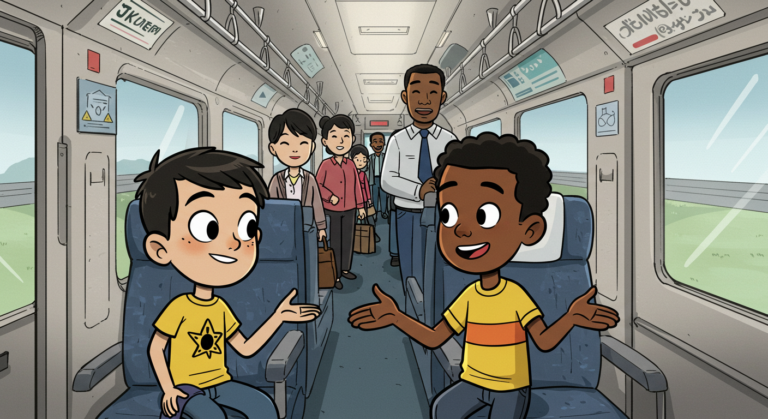The Busan Sharks Go to Seoul

Tonight×意味:
今夜。
文法:
- 名詞句(時間)。
- 今日の夜、夜間を表します。
例:
Tonight, I will stay home.
今夜、私は家にいます。
What are you doing tonight?
今夜、あなたは何をしますか?, I am not tired×意味:
疲れている。
文法:
- 形容詞。
- 体力や気力が消耗した状態。
例:
I am tired after work.
仕事の後で疲れています。
Are you tired?
あなたは疲れていますか?. I am happy. It is not a sad×意味:
悲しい、 দুঃখিত。
文法:
- 形容詞。
- 悲しみを感じている、または悲しみを感じさせる。
例:
I am sad because it is raining.
雨が降っているので悲しいです。
That is a sad story.
それは悲しい話です。 evening×意味:
夕方。
文法:
- 名詞(時間)。
- 一日の終わり、夜が始まる時間帯。
例:
We eat dinner in the evening.
私たちは夕方に夕食を食べます。
Good evening!
こんばんは!. It is a beautiful×意味:
美しい、きれいな、美しい。
文法:
- 形容詞。
- 見た目が非常に魅力的で心地よい。
例:
She is a beautiful woman.
彼女は美しい女性です。
This is a beautiful flower.
これは美しい花です。 evening×意味:
夕方。
文法:
- 名詞(時間)。
- 一日の終わり、夜が始まる時間帯。
例:
We eat dinner in the evening.
私たちは夕方に夕食を食べます。
Good evening!
こんばんは!. I am honored×意味:
光栄に思う、誇りに思う。
文法:
- 形容詞。
- 特別な機会や役割を与えられて喜びと誇りを感じている。
例:
I am honored to be here.
ここにいられて光栄です。
She was honored to receive the award.
彼女は賞を受け取ることができて光栄でした。 to be a Busan Shark. I will write×意味:
書く、記述する。
文法:
- 動詞。
- 文字や言葉を使って情報を記録する。
例:
I write in my diary every day.
私は毎日日記を書きます。
Can you write your name here?
ここにあなたの名前を書いてもらえますか? about today×意味:
今日。
文法:
- 名詞(時間)。
- 現在の日を表します。
例:
Today is Monday.
今日は月曜日です。
What are you doing today?
今日、あなたは何をしていますか? later. It was an awesome×意味:
すごい、素晴らしい。
文法:
- 形容詞。
- とても良い、感動的な、印象的な。
例:
The view is awesome.
景色は素晴らしいです。
That's awesome news!
それは素晴らしいニュースです! day. It was not scary×意味:
怖い、恐ろしい。
文法:
- 形容詞。
- 恐怖を感じさせる、危険を感じさせる。
例:
The movie was scary.
その映画は怖かったです。
Don't be scary!
怖がらせないで!. It was great×意味:
素晴らしい、とても良い。
文法:
- 形容詞。
- 質が非常に高い、優れている。
例:
This food is great!
この食べ物は素晴らしいです!
We had a great time.
私たちは素晴らしい時間を過ごしました。. I am very happy. I am not angry×意味:
怒っている、腹を立てている。
文法:
- 形容詞。
- 強い不快感や敵意を感じている状態。
例:
He is angry because he lost the game.
彼は試合に負けたので怒っています。
Don't be angry with me.
私に怒らないでください。. Everything is nice×意味:
良い、素敵な、心地よい。
文法:
- 形容詞。
- 快適で、質が良いことを表します。
例:
This is a nice hotel.
これは素敵なホテルです。
Have a nice day!
良い一日を!.
Story Questions
Remembering
Recall the basic facts from the story:
- Who are the Busan Sharks?
- Where are the Busan Sharks going?
- What sport do they play?
- How do they travel to Seoul?
- What is the coach like?
Understanding
Explain what happened in the story:
- Why are the Busan Sharks excited?
- What do they do on the bus?
- How does Seoul look?
- Why is the player nervous before the game?
- How does the game end?
Applying
Think about how this connects to your life:
- Have you ever been excited about a trip? Where did you go?
- What do you like to do when you travel on a bus or train?
- Have you ever been to a big city? How did it feel?
- Have you ever felt nervous before a game or a test? What did you do?
- How do you feel when your team or you win something?
Analyzing
Look at how things connect in the story:
- How does the player’s feeling change from the beginning to the end of the story?
- Why is dinner important for the team in the evening?
- What makes the player nervous about the Seoul teams?
- How does winning the game affect the team’s plans for Seoul?
- What are some words in the story that show positive emotions?
Evaluating
Think about the choices made in the story:
- Was it a good idea for the team to go to Seoul by bus? Why or why not?
- Do you think practicing in the gym helped the team?
- Was it important for the team to eat dinner together? Why?
- Was it good for the player to be nervous? How did it affect him?
- Do you think winning is the most important thing in a game? What else is important?
Creating
Imagine new possibilities for the story:
- What if the Busan Sharks lost the game? How would the story be different?
- Imagine another activity the Busan Sharks could do in Seoul. What is it?
- Write a short dialogue between the player and the coach before the game.
- How could the story continue the next day in Seoul?
- Create a new title for the story.






